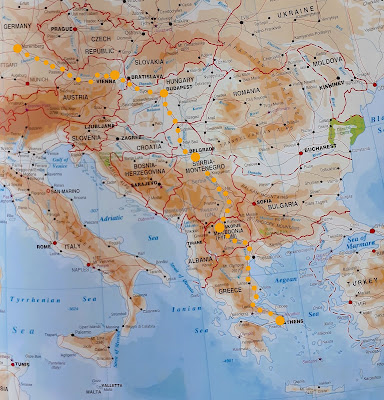Answer: Amin al-Husseini.
Related on the female side to Yasser Arafat, former leader of the Palestinian Liberation Organization, revered by radical Islamists, President Tito of Yugoslavia charged him with war crimes.
Before we discover why, it is important to know what Israel was like before Jews fleeing persecution in Europe made its deserts bloom. Indeed, over half of this tiny country was desert and much of the remainder, malarial swamps. In 1857 the British consul wrote, 'the country is in a considerable degree empty of inhabitants.' Other visitors described it as 'desolate and unpeopled', in 'wretched desolation and neglect' (2). According to Mark Twain, who visited Jerusalem in 1867, the city was so small that one could walk around it in an hour, and hosted a mixed population of Arabs, Jews, Armenians, Copts and other Christians, Latins, Syrians and Abyssinians, speaking a variety of languages. Outside the walls, Bedouins rode wildly across the landscape. 'It seems to me that all the races and colors and tongues of the earth must be represented among the fourteen thousand souls that dwell in Jerusalem,' Twain wrote. 'Mournful, and dreary, and lifeless. I would not desire to live here' (3).
Thirty years later, Amin al-Husseini was born into this unprepossessing community. In a quick overview of his life, one thing is apparent: he always seemed to be fleeing from something. In 1920, he fled from Jerusalem to Syria to escape imprisonment by the British for inflammatory speech during the Jerusalem riots. He was a pivotal figure in the Hebron Massacre of 1929. In July 1937 he fled the British again, disguised as a woman, for his part in the Arab revolts against them and the Jews. Later that year, he fled to Lebanon, this time disguised as a Bedouin. As his relationship with the French and the Syrians deteriorated, he fled from there to Iraq in 1939. 'In October 1941 General Wavell, commander of the British Middle Eastern forces, offered a $100,000 (25,000 pounds) reward for [his] capture...dead or alive...being under a still valid warrant of arrest of the Palestine government for the assassination of Jews, Arabs, and British, including Galilee Commissioner Andrews.' (8). From Iraq, al-Husseini fled 'to Iran and hid himself in the Japanese Embassy'. From Tehran he [fled] to Italy' (8). From November1941, we find him in Germany supported by Hitler. In May 1945 following the dictator's suicide, he fled first from Austria to Switzerland and then to Germany where he was arrested by the French (4). It was while he was in France under house arrest that the request for his indictment arrived from Yugoslavia and so, in 1946, he fled yet again to Egypt where King Farouk of Egypt granted him asylum (5, 7).
As someone who has visited the former Yugoslavia once and since its breakup, Bosnia twice, and Serbia and Croatia many times, I have observed that Bosnia, although rich in natural resources, is the worst off. It is very poor. Unemployment is high. I saw whole villages lying deserted because the inhabitants had left for a better life. Over the centuries Bosnia has been exploited by the Ottomans, the Austrians, the Nazis, and most recently by political Islam. A young sales assistant we spoke to, a university graduate, told us in perfect English that it was generally felt that a war was again approaching.
1. Taxation in the Ottoman Empire - Infogalactic: the planetary knowledge core
2. The Population of Palestine, circa 1875 on JSTOR
3. The Innocents Abroad, Complete | Project Gutenberg Chapter LIII
4. Unmasking Hajj Amin al-Husseini through his wartime letters and diaries
5. From Hitler to Hamas: A Genealogy of Evil » ISGAP
6. EDITORIAL: The Koran itself says Jews will return to their land
10. 13th Waffen Mountain Division of the SS Handschar (1st Croatian)














.jpg)
.jpg)

.jpg)
.jpg)




.jpg)

.jpg)









.jpg)
